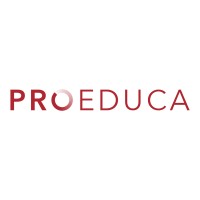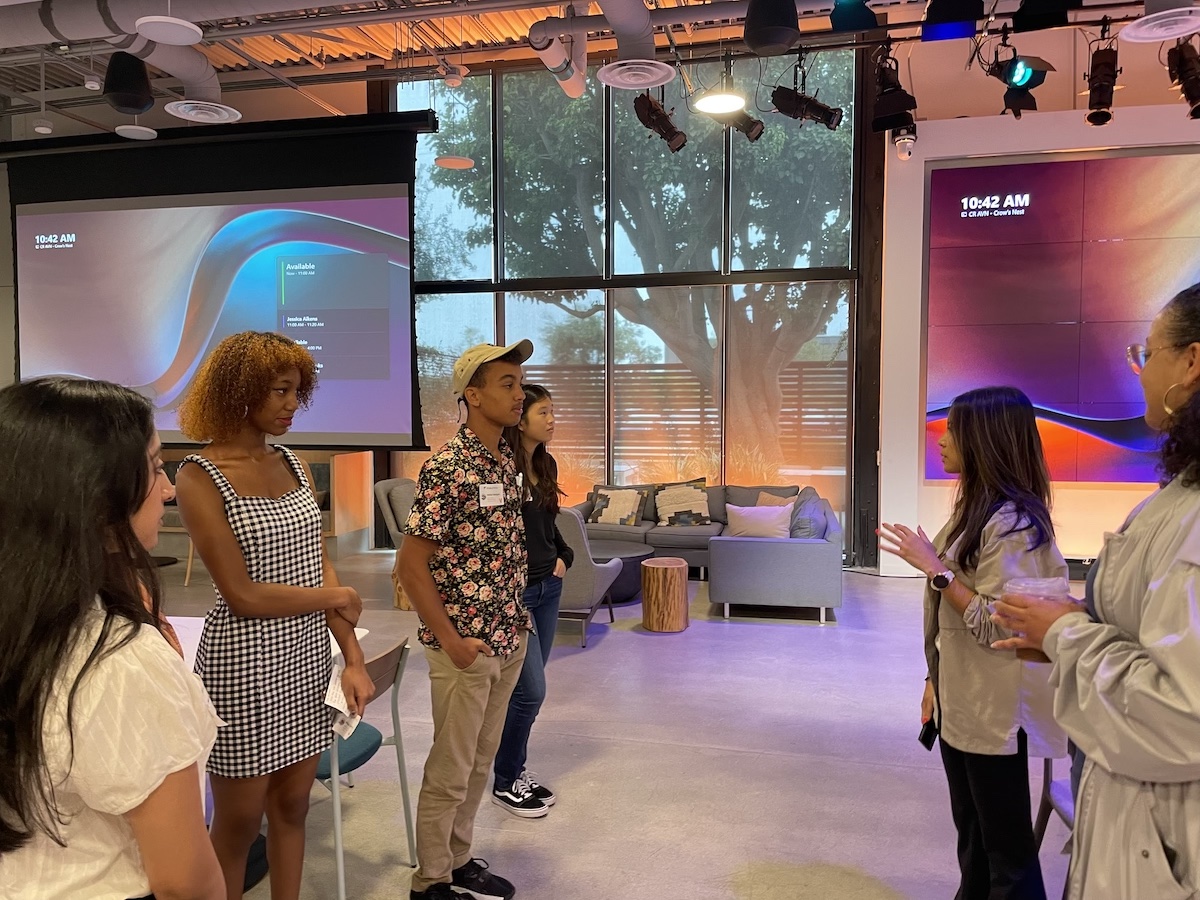
UNIVERSIDAD 2024
PORTAL LEARNING
By Ivan Cestero, Director of Career Connected Learning
A Holistic, Experiential Career Learning Model for High School
Over the last decade Career Connected Learning (CCL) has emerged as a consensus opportunity area to better align archaic education systems and modern workforce needs. While much of the early funding and resources in this space understandably focus on higher education options, there is now considerable demand to push CCL upstream to the K12 space and, in particular, to transcend traditional Career and Technical Education (CTE) curriculum-driven pathways to reflect the changing nature of work and more deeply impact student trajectories during, instead of, and beyond college. Portal Learning bridges the education to employment gap in a new and scalable way, connecting students directly with employers across numerous engagements for mutual benefit. As a model provider, Portal delivers holistic experiential learning for students and a novel CCL program blueprint for schools; for companies, it provides a range of solutions across talent, social impact, and community engagement. As it grows, the vision is to bring historically separated sectors together sustainably, creating new kinds of value and accelerating the lifelong learning revolution.
A Broken Pipeline
In the United States, the disconnect and friction between high school, college, and career systems results in significant gaps within the school-to-work pipeline. This hampers economic progress for graduates and creates challenges for employers and communities broadly. In response, experts across sectors (Bain & Co, Jobs for the Future, US Government, Chambers of Commerce) are advocating for more and better Career Connected Learning (CCL) options. The growing demand for education reform set against the disruptive rise of hybrid work and AI has created a moment ripe for innovation. Portal Learning is designed with three salient trends in mind:
First, the college value proposition is at its weakest point ever. The industry is shrinking as both families and companies are questioning the value of the diploma in the face of the college debt and dropout crises, and poor first job performance of college grads. An alarming amount take over six years to graduate, or fail to complete their degrees altogether (especially among low-income students and marginalized groups, Portal’s target audience). Moreover, 49% of individuals work in fields unrelated to their formal education, compromising economic mobility and company productivity.
Second, a skills-based economy is emerging based on the micro-credential revolution and the rise of Learning and Employment Records (LERs) and portfolios. In response to the disconnect between the academic skills graduates possess and the durable skills sought by employers– contributing to a 40% underemployment rate– the latter are increasingly investing in internal upskilling solutions and slowly shifting to skills-based hiring.
Third, high schools are leaning into dual enrollment options but need more than college credits; they desperately need relevant, experiential, personalized learning options that better equip and motivate students for what’s next. Teenagers graduate without the necessary self-awareness to identify, pursue, and persist in a well-suited job that aligns with their strengths and interests. At the same time, as entrepreneurship and apprenticeships mainstream and content creation explodes, youth will increasingly look to go straight to work, supported by discrete micro-credentials and work experience.
Taken together, the data suggest that innovation in higher education alone is necessary but insufficient: we must repair the broken pipeline from K12 to workforce. Entirely new models along the lines of JFF’s Big Blur are needed– in which work, learning, and personalization are integrated and unbeholden to archaic system constraints. At the same time, there is a parallel– and perhaps more urgent– need to help existing high schools transform by more seriously and creatively integrating the world of work into their learning experiences. What if we connected schools directly with employers at scale?
Bridging the gap between education and employment
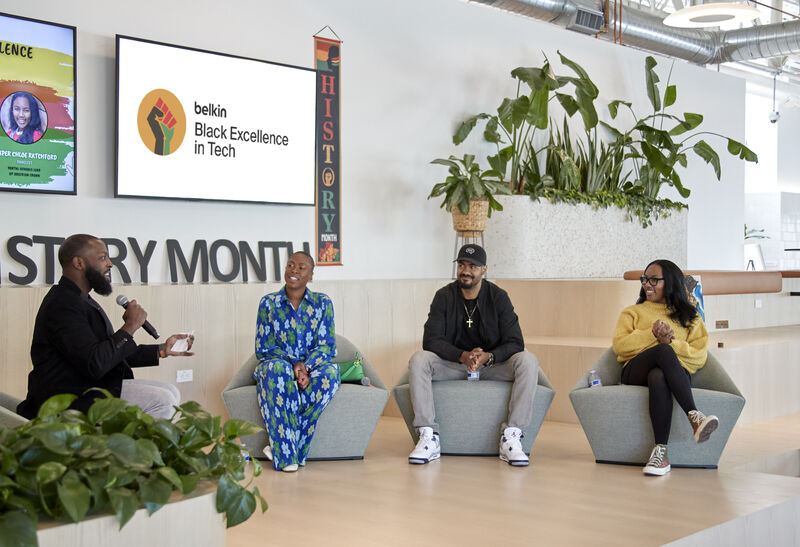
Born from its experience as a micro high school living inside a corporation (2021-23), and the promising results of direct collaboration between teenagers and professionals, Portal re-launched as a model provider in fall 2023 to support the quality and scale of school transformation needed today. Portal Learning is now in its first year as a workforce development intermediary connecting high school students and local and global employers in a hybrid, ongoing, shared value model. The long-term goal is to develop the career pipelines needed to fuel economic growth and increase income mobility for the next generation while helping employers access talent and positively influence educational curricula. We believe this collaboration will unlock new opportunities, with young people empowered as creators and doers, while employers gain access to next-gen talent, reduce junior employee churn, and deliver social impact.
Portal hosts a variety of experiential engagements with employer partners (whom we call Pro Partners), supported by a social-emotional and upskilling curriculum. Educators deliver curriculum and student support, while employers provide the work experience and subject matter expertise. The model relies on two key elements: first, thoughtful learning design, composed of a phased learner experience (LX) and educator onboarding; and second, the employer value proposition with clear return on investment (ROI) for ongoing engagement.
Outcomes and Incentives
By doing real projects and connecting with industry experts from day one, students develop in-demand durable skills and mindsets around creative confidence; social capital based on professional skills and networks; and a purpose mindset based on self-awareness and a life design plan. These are the key ingredients required for a successful launch into life and career after high school, regardless of specific profession, that most high schools and many colleges still do not consistently provide.
This comes via a variety of authentic experiences– first mentoring, design challenges, and job shadows; and then micro internships, project consults, and capstones– delivered in a professional, entrepreneurial environment that feels more like work or a startup than school. In line with our emphasis on experience and work/life readiness, all formative work at Portal is aimed at supporting the summative outcome of a “portalfolio” of applied skills and project assets that demonstrate each Learner’s unique identity, accomplishments, and direction.
This form of experiential learning features authentic projects that are driven by the needs and expectations of clients. However, this “high-stakes, high-reward” approach requires significant preparation, scaffolding and even a degree of unschooling. Most teenagers are unaccustomed to real world, rigorous work that is measured in competencies, reflection, and project assets rather than grades, GPA, and testing. Schools, for their part, are not built or incentivized to accommodate such work, from holistic assessment to community engagement. And most professionals and companies, if they do work with youth at all, do so in ad hoc or surface-level rather than ongoing and deep ways. Portal meets these key stakeholders where they are at and supports them accordingly.
Consequently, incentives and ROI play a key role in the model’s success. Students are incentivized by practical rewards of gaining skills, a portfolio, and social capital that align with the real demands of both college admissions and the working world. Schools are incentivized by the opportunity to develop and eventually own a sustainable and effective CCL program– which, notably, builds teacher and leader capacity in project based learning (PBL), design thinking and community outreach. Employers gain new ways to attract and retain GenZ talent, deliver compelling impact, and access new IP that they would struggle to achieve on their own.
Student experience
Internally, the career-connected learning architecture is built upon three interrelated pillars, each addressing specific career and life-related needs:
- The Personal pillar focuses on social-emotional development and career exploration, providing students with opportunities to understand themselves better and explore pathways.
- The Practice pillar emphasizes upskilling and project work, enabling students to develop practical skills and gain hands-on experience in their chosen fields.
- The Professional pillar centers around work-based learning, connecting students with professionals and offering real-world industry experiences.
Regardless of local deployment method (1 hour doses across the week as an elective, multi-hour blocks, after school club, or even a full day per week), all Portal students operate within the global pillar and phased approach guiding them across expansive opportunities and reductive focus on their chosen field.
Together, these pillars create a holistic learning experience that is greater than the sum of its parts. On an individual level, students have the autonomy to personalize their learning experience by selecting projects and focusing on areas of interest. This empowers students and enhances their engagement and agency. On a collective or cultural level, the structure is a vehicle for cultivating a professional environment.
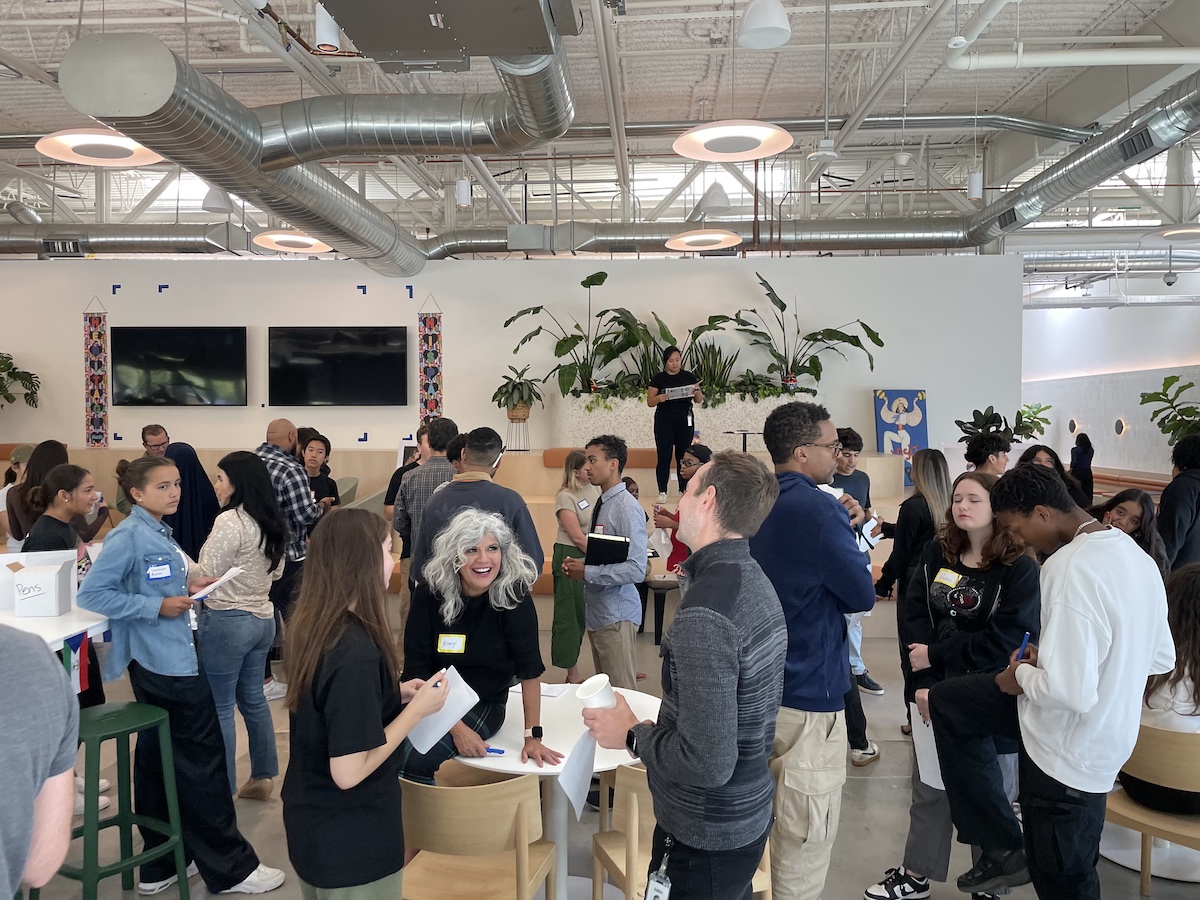
The pillars unfold in increasing depth over the course of three phases, roughly aligned with academic years: At the outset (Phase 1), students need “off stage” upskilling, context setting, time to explore, and space to adjust to our professional setting and expectations. However, across subsequent years, with more experience (Phase 2), students will spend more time doing projects with and for professionals. Ultimately, as the quality of work, creative confidence, and professionalism increase (Phase 3), students are ready to shine “on stage” with as much professional work as possible in a completely personalized way. This will take various forms– from consulting projects with partners to deeper internships to individual entrepreneurship or capstones.
Portal Learners opt into our program from their local schools. With our first partner, Da Vinci Connect HS in Los Angeles, we serve 50 students (of the 400 person student body) for 6 hours per week. They don’t take classes or get traditional grades. Instead they are constantly leveling up: completing tasks, workshops and projects that create assets and demonstrate applied skills. Meanwhile they accumulate points that unlock further opportunities. The gamified approach creates organic incentives for students to own their learning by making choices and personalizing in greater depth. It also ensures that learners don’t just show up, but do the work.
This entrepreneurial environment builds autonomy and agency. As learners progress, their experience is less programmed and more open to their own vision and direction. Properly trained, they create their own opportunities by inviting workshop presenters, recruiting new Pro Partners and project briefs, and ultimately building their own capstone projects or ventures. For example, after completing the professionalism workshop, joining a few career workshops, and exploring their own areas of interest, students may be ready to reach out directly to a Pro Partner for support or cold-invite an expert on Linked to give a Career Workshop. The key to both individual learner success and Portal’s collective growth is deep trust in the ability of youth to rise to the ocassion and add value to their professional engagements.
The learning experience is embodied by what we call realness: providing unique, diverse and ongoing opportunities to do real work. The more real work students learn about, engage in, and deliver, the better and more authentically they will develop the skills, mindsets, and maturity for success. It recalls Ron Berger’s “Ethic of Excellence,” an approach that motivated middle school students to find fulfillment in high quality, relevant work with and for the community. At a more mature level and at scale, this approach translates to professional partnerships, influence, feedback, and inspiration.
Employer Experience
As noted, successful execution of the Portal model requires sustained industry-side engagement from a growing ecosystem serving evermore schools; unlocking the precise value proposition is critical. We currently work with 15 employers from corporations (Belkin, Snap, Fabletics) to mid and small businesses and startups. All have varying reasons for engagement, timelines, and available resources. Some lean more toward employee experience; others seek Gen Z insights and student labor. Incentives and terms of engagement are often products of company mission and culture, specific opportunities on the ground in a department, or employee intrapreneurship.
Significantly more research is necessary to establish best practice for school collaboration, but early work suggests we are on the cusp of major changes– in which context a seemingly unrealistic concept like connecting teenagers and companies may actually make sense. Building on the trends in the introduction, companies are grappling with major questions in the post-Covid world of work:
- If the future is hybrid, what do our offices look like? How will we use our space and get employees back to the office?
- In the intensifying war for talent, how will we stand out as a company? How will we meet millennials’ outspoken preference for a greater sense of purpose and diversity at work?
- How can we leverage the emerging skills-based economy to attract younger digital native employees at earlier stages? How might we upskill them to enhance retainment?
Portal helps employers solve these problems. At Belkin International, their recent investment in a new headquarters in El Segundo includes 3500 square feet dedicated to Portal’s flagship programming space- an investment in the company’s north stars of education and community. Abuzz with student work, it is a highlight on visitor tours of Belkin HQ. Teenagers are now a regular fixture in the lobby area, doing quiet group work or engaging with employees at company events like Panels and gatherings. At Belkin, Fabletics, and TechStyle, employees prefer to come into the office to attend monthly mentor sessions in person. Snap has praised the Project Consult team working on an inclusion and community brief for Snapchat, and has regularly invited Portal to their HQ for tours, demos and networking. Creative agencies like Anomaly, Saatchi and Saatchi and Ronin are sharing the agency model while accessing GenZ insights in direct and promising ways. Entertainment and marketing firms like Picture Motion engage students in impact campaigns.
These are small sample sizes, but we believe they are signals of an emerging reality. Of course, this is not easy work, and employers need time to warm up to the opportunity. Understanding that employers face challenges in committing resources and time to student volunteerism, we collaborate with authorities and workforce development intermediaries like Chambers of Commerce, JFF (who host Horizons, an important annual gathering in this space), Economic Development Councils, and others to troubleshoot, de-risk, and reduce friction while increasing incentives. We do this in three primary ways:
- Offering choice via a menu of engagement: Traditionally, employers work with an internal lead or outsource volunteerism to a nonprofit that specializes in mentorship or community projects. Instead of an external provider for each service (mentor.org for mentoring, Multiverse for apprenticeships, etc), Portal offers a variety of opportunities under one roof, allowing employees to choose what matches their interest and availability. Initial recruitment focuses on the throughline of building relationships with youth; onboarding then isolates each particular engagement, which has its own playbook, content, automated notifications, etc.
- Focusing on multiple sources of employer return on investment (ROI): “Doing it for the kids” is not a viable source of sustainable partnership. We consider partnership a medium to long-term investment in a company’s people, culture, and even IP. That said, we recognize the need to categorize and quantify the benefits, and work with various points of contact toward those ends. Currently our most common interlocutors sit in the HR, DEI, and Innovation spaces within companies.
Customizing our global model for local employer needs: Portal is committed to adjusting our blueprint for local company needs and opportunities. There is no single required starting point. Many individuals find the Career Workshop an easy first step; this is a simple hour to explore collaboration, meet students, and establish trust– and lead to deeper work. But some companies prefer to focus on mentoring or go straight to a project consult. It’s about finding the best fit and building from there.
Project Consults: our big bet
We believe the Project Consult is the most high-leverage engagement for realness at Portal and beyond. It is a fixed-time design challenge based on a brief co-created with Pro Partners– a concentrated vehicle for delivering deep learning to students across a variety of topics, while also ensuring value for employers. Each brief presents a new opportunity and professional context for students to hone fundamental durable skills.
For example, Portal student teams have worked with tech giant Snap on an inclusion brief; creative studio Wavetable on a self directed learning tool; social impact marketing group Picture Motion on a documentary impact campaign; Belkin on search engine optimization and on-site sustainability; Noan, an AI-powered entrepreneurship platform startup; and Saatchi and Saatchi, Anomaly and other agencies on building our student-run agency.
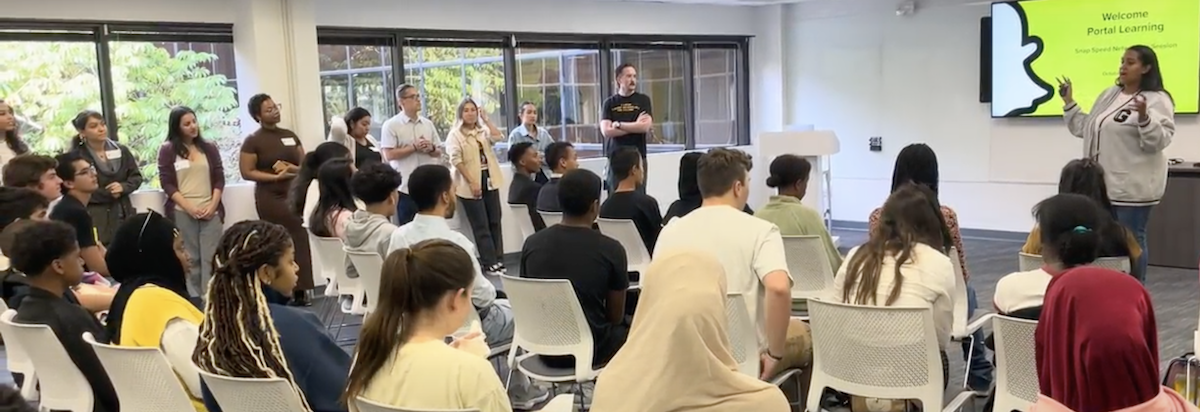
Consults follow an entrepreneurial design thinking process which is introduced in a foundational workshop for Learners. While individual briefs may vary, they generally align around these phases: Discovery (“getting smart” on the problem space via research and interviews); Synthesis (making meaning from data and re-defining the problem); Ideation (democratically brainstorming a variety of possible solutions); Prototyping (building your solution and iterating upon feedback); and Presenting (sharing and storytelling with documentation and assets).
At the same time, teams divide the work across specific roles, which evolve across project phases. Learners lean in and out accordingly, recognizing their time to shine, deliver, and support. They are also vehicles for exploring crucial work-specific capacities. Students are often surprised by the rigors and rewards of research. Managers learn to work through frustration. Creatives realize, `to their glee or paralysis, just how deep design thinking goes. Comms learn how to manage a contact list and key
The Consult approach may herald the future of industry-education collaboration for two reasons. First, it most closely mimics the world of work our students will soon join; and second, it can serve as the most efficient, scalable vehicle for growing the ecosystem of pro partners and bridging the education to employment gap. Notably, the US Chamber of Commerce is set to build out a similar approach, albeit entirely online, in their EPIC challenges.
Conclusion
The future of learning and work is about lifelong learning, upskilling, micro-credentials, and experience– not grades and diplomas. Success requires individual excellence, collective collaboration, a strong body of work and an active network. Portal is designed to meet these needs. We are starting small with 3 more clients on tap for next year.
Moreover, the educational landscape is changing rapidly. The college value proposition doesn’t make sense for a majority of youth. High school needs an upgrade. Both models are largely disconnected from the voice of employers and demands of today’s working world. By directly connecting companies and schools, Portal provides a much-needed alternative and connective tissue in the CCL space, guided by the conviction that well-architected partnership will unlock new value for businesses while guiding the new learning models schools desperately need.
Portal is just at the beginning of this journey, but we are not alone. We are inspired by many successful organizations: Big Picture Learning, One Stone, Mount Vernon, The Knowledge Society on the education side; CAPS Network, CareerWise, Multiverse, Forage, Riipen, Parker Dewey, and others on the intermediary side; and, on the professional side, the creative agency model, in which organizations manage ongoing project briefs with a variety of clients, building problem-solving and subject matter expertise and relationships over time. Our growing numbers suggest a bright future for Career Connected Learning.
Author: Ivan Cestero
Director of Career Connected Learning & Strategic Partnerships at Portal Learning

This project was created in collaboration with:
Proeduca Group
PROEDUCA’s objective is to provide the best online higher education to its students and it achieves this through educational commitments at three universities: The International University of La Rioja, the Online University of Mexico (UNIR Mexico), and CUNIMAD. It also offers studies located in Peru, at the Newman Postgraduate School, and in the United States, where it has a presence through MIU City University Miami.
